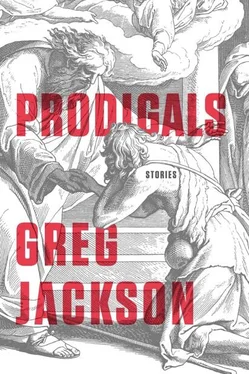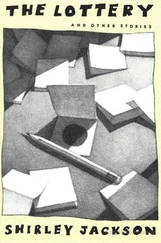“It’s like … it was all choreographed for me,” she said, her voice hushed and marveling. “Like everything was arranged for me. To experience just like this .”
It took me a second to realize what she was saying and what it meant, to gather my thoughts and say the only thing there was to say.
“But that’s what it is,” I said. “That’s what being on drugs is.”
Serve-and-Volley, Near Vichy
I was thirty-four when I met Léon Descoteaux, the famous tennis player, and stayed for a few days at his home in France, where he lived with his wife and children. I was traveling with my girlfriend of the time, Vicky, and she was old friends with Léon’s wife, Marion, from when the two had been on the tour together. It had been ages since Vicky had last seen Marion, and she convinced me to stop in on the Descoteaux on our way to Rome, where the uptown magazine I was on assignment with wanted me to do a travel piece. “Rome to the Maxxi.” “Beyond Trastevere.” Something like that. I was toying with the idea of proposing to Vicky and thought that if I got up the nerve Rome was the place to do it.
It was an odd moment in my life. I no longer felt young, but I didn’t feel exactly old. I felt, I suppose, that I was running out of time into which to keep pushing back the expectation that my life would simply sort itself out and come to resemble the standard model. Vicky and I had known each other from college, one of those prestigious East Coast schools whose graduates are cagey about where they went, and we had reconnected two years before. That was five years after she’d given up pro tennis and fallen, in her blithe, chipper way, into a job at a consulting firm. We were not the most natural fit, Vicky and I, but I had scaled back my ideas of romance and she must have too.
The Descoteaux were living in the countryside of the Auvergne, not far from Clermont-Ferrand but pretty far from everywhere else. This was why Vicky hadn’t seen Marion for so long.
“Léo has her secreted away in middle-of-nowhere France,” Vicky said. “I can’t imagine how she can stand it. She was such a party girl on the tour.”
I said maybe it was glamorous living in exile with a tennis legend, maybe people change.
“Not from Liberace to Thoreau,” Vicky said with her great mischievous smile. When she smiled that way, I felt, just possibly, that I could spend a life with her.
“Léon Descoteaux,” I said and shook my head.
I was excited about this part of our detour, I admit, the Léon Descoteaux part. It was why I had agreed to go with Vicky. I didn’t think of myself as a person especially fascinated by celebrity, but that didn’t mean I wasn’t curious to meet the guy and peek in on his private life. It would be a story I could tell people, a casual small-talk currency. Hey, did I tell you I spent a weekend at Léon Descoteaux’s place in France last month?… a while back?… when I was in my thirties?… decades ago?
There was a more personal reason too. I was no huge tennis fan, but I watched the Slams when I could, and once, about fifteen years before, I’d seen Léon play a gutsy five-set semifinal against some Scandinavian phenomenon. Léon was at the peak of his career, number six in the world, and though it was clear that his finesse game didn’t stand a chance against this freakish Nordic power baseliner, Léon, with his becalmed court presence and upright bearing, played the Viking to a fifth set and a tiebreak too. I remember few tennis matches, but in the hours I spent watching this one I formed a bond with Léon Descoteaux and I rooted for him throughout the rest of his career. He had a slim body and moved lightly around the court with a kind of magic poise — the sort, I suppose, that you need to return a 125-mph serve. It may have been no more than this: I saw someone who moved with particular beauty or grace and the animal part of me responded. But in the story I told in my head, I admired his stoicism in the face of what seemed to me an occasion for despair. He was more skilled than his opponent but unable to compete with him physically. This hard-fought loss would be the best Léon could do, perhaps the best tennis he would ever play. So what I was watching, I felt, was someone almost without peer confront exactly the limit of his ability. Most of us don’t ever get to be sixth best in the world at anything, fair enough. But then neither do most of us have to face such an objective, historical accounting of the upper limit of our talent.
On the plane over to France, above the dark nothing of the Atlantic before dawn, with the wing light blinking to my left and Vicky dozing against my right shoulder, I imagined that Léon and I might strike up a friendship, that after a few days I would tell him about watching the U.S. Open semifinal all those years before. I might say something like, “I fell in love with your game, Léon. I was living and dying with each of your points. And although you lost the match, I thought you played with terrific guts and poise.” I had no illusion that I would actually say this, but I was in the habit of making these little speeches in my head. The vacant ocean passed beneath us. I was awake when the world began its too-early brightening.
* * *
We made our transfer in Paris and I finally sacked out on the domestic flight, only to be awoken what seemed minutes later by Vicky saying, “We’re here,” with annoying cheerfulness.
For a minute I had no idea what “here” she meant. A pall of exhaustion and physical misery enveloped my mood, and I thought suddenly that the trip had been a mistake, my fantasy of a warm friendship with Léon Descoteaux close to lunacy, and, most troubling of all, that I was following around a woman I barely knew and to whom, in the stark sobriety of daily life, I had almost made the mistake of proposing. I had these feelings about Vicky from time to time, and I think she must have had them about me too, because there were points at which we so thoroughly baffled each other that we were forced to confront the origin of our intimacy in college, when we were so young and drunk and hopeful that it was easy simply to adore other people as the mirror images of our own bright futures. There was more to me and Vicky than that, surely. But there was also a sense in which what held us together was having come to know each other before we knew ourselves and before, as a consequence, we knew how impossible it was going to be to know anybody else.
I can be a bit moody, and I certainly have that male thing where my bad mood is the world’s problem. So a lot of what I was feeling just then, as I waited for my bags to not-arrive in Clermont-Ferrand Auvergne International, was dubious and melodramatic. I was trying to convince myself that new luggage was still being added to the carousel fifteen minutes later, when Marion showed up.
“Victoria!” she said, spotting us and raising a hand. She was an impossibly pretty woman of some wonderful, indefinite European age, who gave off an aggressive public comfort in her body that I took to be distinctly French.
“Marion, this is Daniel,” Vicky said once they’d embraced. Marion looked me over like a rental billed a notch or two above its class.
“A pleasure,” she said.
“Enchanté,” I said and felt immediately like the sort of seamy flirt who says “enchanté.”
“Poor Daniel,” Vicky said. “He didn’t sleep on the flight over and now his bags are lost.” She rearranged my hair.
“Mais non,” Marion said. She swept a hand across the scene. “They are all idiots here. Consanguin , you know? C’mon, we’ll give you Léo’s clothes.”
My mood lifted as we drove beyond the outskirts of Clermont-Ferrand. Marion turned onto a rural highway and in a matter of minutes the land opened out into gorgeous hilly country. It may have been this beauty, or catching a second wind, realizing that I was okay and not teetering on the brink of inward collapse, or it may just have been one of those moments when, like a flipped switch, you go from thinking the world is conspiring against you to seeing that the world doesn’t care and you are free to find your own happiness or sorrow.
Читать дальше












